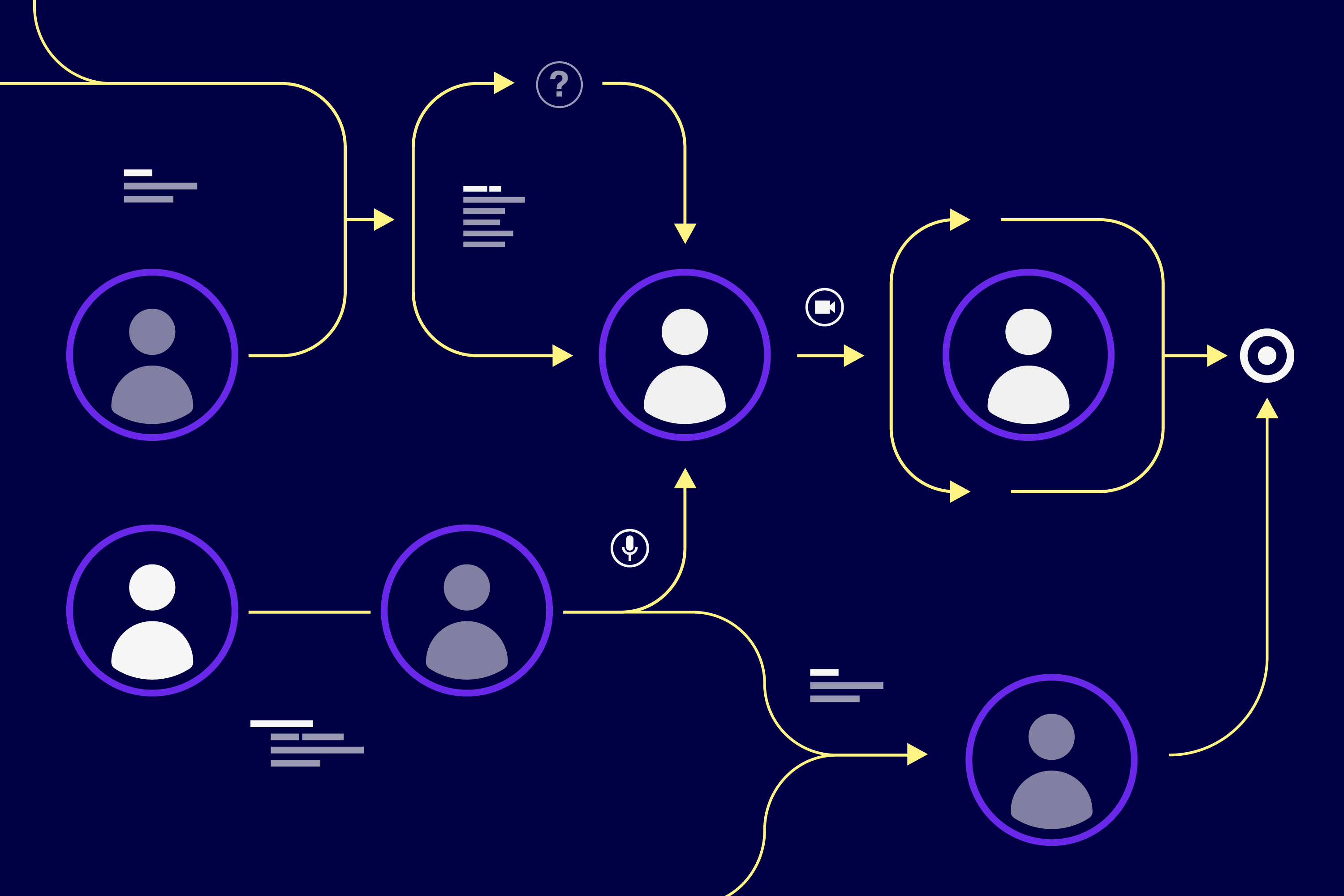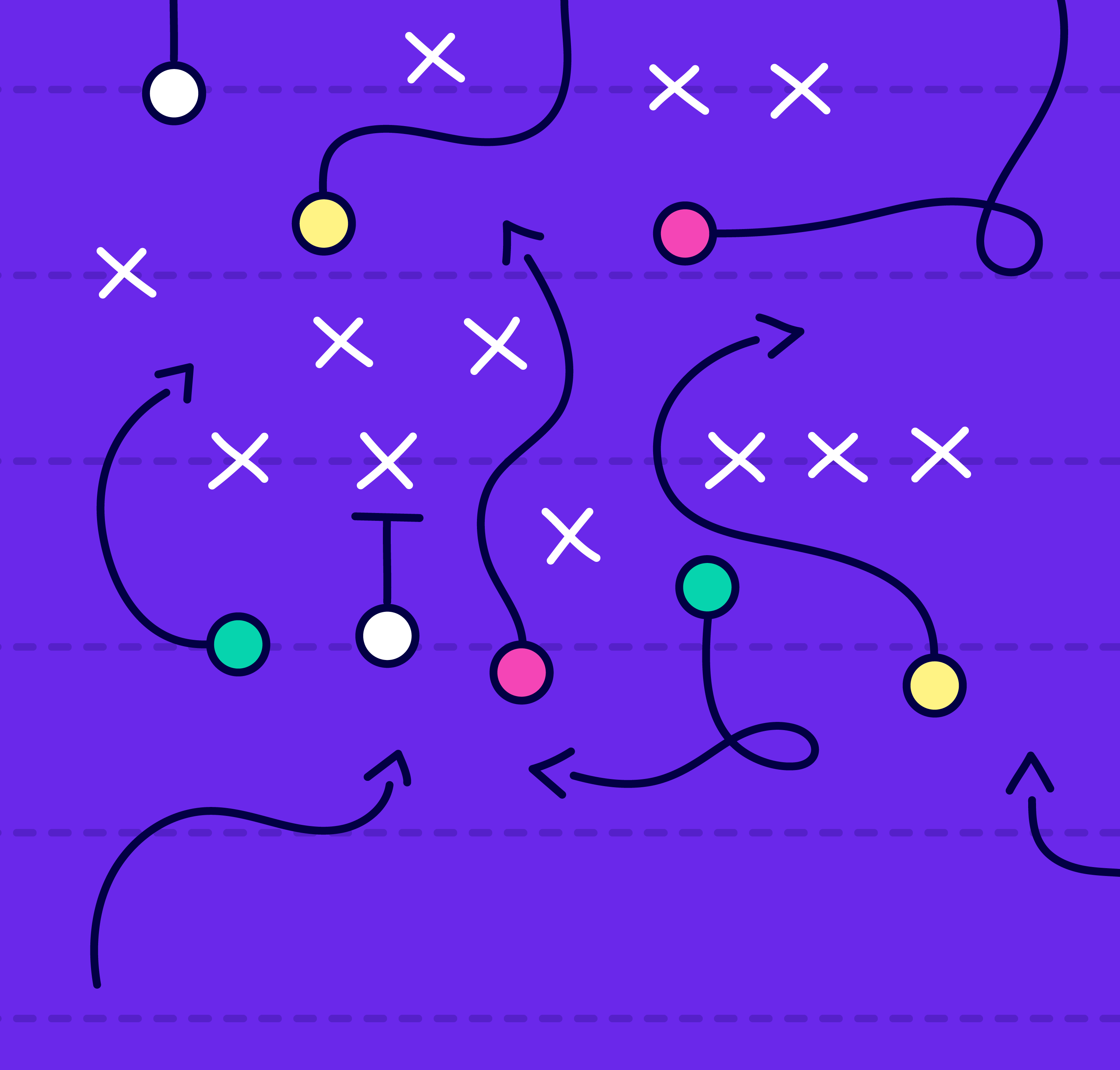
Articles
How To Go From Doing To Leading With Delegation
May 14, 2021

Delegating work is probably the hardest move you'll make as a business leader. Your business is your baby. And because you're protective over it (understandably so), you do as much of the work as possible to make sure it's done right.
But if you want to scale your company, you have to stop doing it all yourself. And you need to start leading instead - which means you need to start delegating.
Without delegation, you're stuck working in the business. Meaning, you have little (or no) time to focus on your business. So, you're left feeling overwhelmed, overworked, and over time, tempted to give it up entirely.
But when you use effective delegation, the work gets done without you because the right people are focused on the right tasks. And, as a result, you get to reinvest your newly freed-up time into growing your business.
👉 Want to skip straight to delegating? We've made it easy with our new Delegation PlannerTM.
What is delegation?
Delegation is the passing of authority and responsibility from one person (usually a manager) to another (usually a contributor). Meaning, it's when you assign work to another person and trust they'll do it right.
And it's widely considered the more important (and perhaps most underrated) component of great leadership. It’s also one of the most difficult skills to develop and manage.
If you're like most leaders, you feel ownership over your work. And you falsely believe you're the only person who can get the job right.
But by embracing delegation, you can step away from doing all the work yourself. And you actually propel you, your team, and your business forward because you're not stuck in the day-to-day!
At a high level, the delegation process starts by looking at your plate and deciding which work you need to do yourself. And consequently, which work someone else could do. Then, passing off that work to someone else.
Once you've delegated the work, the delegate (AKA the person on the receiving end) owns it. And this person is largely left alone to complete this task. Meaning, the work is carried out with little intervention from you (the business leader).
Otherwise, you run the risk of being overly involved and crossing into micromanagement. At which point, rather than propelling your team, you stand in their way.
That's where trust comes in. Once you align expectations, you need to step back, so the delegate can take full responsibility for the process. And as a result, you free yourself to focus on areas of your business that need your attention more (like your high-level strategy)!
When should you start delegating?
Ideally, you should start delegating tasks as soon as possible. This could mean the moment you hire your first employee (this is best practice). Or, if you already have employees, the moment you start feeling overwhelmed or like you're burning out.
But if you've been running your business for a long time, the exact moment to start delegating might not be so clear. In fact, you unknowingly might have blown past that point already.
So, here’s a few signs that it's absolutely time to delegate:
- There's not enough time in a day for you to complete all your business' essential tasks
- Key areas of the business lack the attention they need
- You feel overworked, burnt out, or start dreading your work
- Another team member is better suited or more qualified for a specific task
- You have little or no time to focus on growing and scaling the company
But delegation doesn't always have to happen at scale-or-fail moments. You can also use it to support your team's professional goals. For example, maybe one of your employees has expressed interest in a certain responsibility. Or, you want to develop your employees' skills, so they can earn that promotion.
In these cases, delegation can be the differentiator between your team staying stagnant and leveling up. It's just an added bonus that you free up some of your time to work on your business!
Why bother delegating?
If you're like most business owners, you started your company working as a technician. Meaning, you provided a service slash product, completed all the work yourself, and took full ownership of the results. But at some point, the work caught up to you. And you realized you couldn't possibly do it all on your own.
This is the importance of delegation - and where the magic happens. Because by hiring people to help out, you relieve some of your responsibilities. And you finally stop being the technician and start being the business leader.
I know - you're probably thinking, but I was always the business leader? And by title, you're right.
But here's the deal: if you want to be a great business leader, you can't be stuck doing the work. Even (and especially) if you feel like you’re the only one who can do it right. Because, in reality, this does more harm than good for the business. And that's not leadership. Not good leadership, at least.
Instead, you end up being the bottleneck. Meaning, you're what holds up other work from getting done. And stretched too thin, your contribution (when it finally happens) is likely less-than-stellar.
Short of delegating, there's no easy way to fix this. Because without things coming off your plate, nothing's going to get better. And eventually, you'll burn out, quality will slip, and closing your doors might be the only remaining option.
But by delegating tasks that don't require your attention, you can create a chain of command. That way, your business runs like a well-oiled machine - without all the work falling on you.
🔥 Tip: Trainual makes it easy to take tasks off of your plate. Because it puts all of your company's how-to's in one centralized place. That way, anyone on your team can do what you do - taking you out of the equation. Try for free.
Why leaders avoid delegating
Before you start delegating, you need to understand why people (possibly you too) avoid it in the first place. Otherwise, chances are good that you'll delegate a few things. Then, take back the responsibility and be right back to doing all the work yourself.
So, here it is: most business leaders don't delegate because they feel like they'll lose control. Meaning, they won't have a say in how the work gets done, when it's done, or the outcome. And that's terrifying for most leaders.
But the truth is, you hired your team for a reason. And when you give each team member a part of the business to own, you build a better business.
Think about it this way: if you can't trust your employees to carry out daily tasks, what kind of message does that send? Not a good one. Because all you're really doing is stripping your team of any autonomy and communicating "you can't do this" - in not so many words.
But they can absolutely get the job done and do it right! You just have to delegate the work to them and give them a chance to prove it. And if you do, you'll see the work gets done on time and to your quality - without you having to do it yourself (I promise).
How to successfully delegate
So, it's time to decide: do you want to do all the work yourself? Or are you ready to start delegating? (Hint: there is a correct answer to this one.)
If you said the latter, use our easy 5-step process for delegating work like a boss! By hitting each step, you'll ensure everything gets done, and you don’t have to do it yourself. Plus, you won’t lose any of your control!

Step 1: Determine what to delegate
First thing's first, you need to know what's on your plate to know what should come off it.
So, start by listing out all your recurring tasks and responsibilities. AKA what you do on a daily, weekly, and monthly basis. For example, you might put down coordinating freelancer invoices, balancing the books, or running team syncs.
To make sure you don't miss anything, take into account your short-term and long-term goals as well. What are the less frequent tasks related to these goals that you do? And what added responsibilities do they bring? Write those responsibilities down too. This way, nothing slips through the cracks.
Looking at your list, highlight which tasks someone else could do - or aren't worth your salary. These are all tasks you need to delegate. Period.
Step 2: Choose the right delegate
Now, you need to figure out who you're going to delegate each of these tasks to. Notice how I said "each of these tasks?"
Rather than dumping all of the tasks onto one person (that'll be a disaster), spread them out. Meaning, delegate a few tasks to several different team members.
To do this, make sure you're looking at your team as a whole. And figure out who would be your top choice to take over each task. But before you delegate the work, you need to check each person’s bandwidth, skill-set, and experience level.
Bandwidth
There's no point delegating new work to someone who already has a full plate. If you do, you'll either create a new bottleneck or burn this team member out. Either way, it won't be pretty.
So, check that this team member has enough time to complete the delegated task on top of their existing workload. If they need to work overtime to get it all done, you need to pick someone else - or take something off their plate.
Skill-set
Ideally, the person will already have some (or all) of the knowledge and skills necessary to complete the task. Otherwise, you're starting from scratch. This is fine but not recommended. Because the fewer gaps you need to fill, the faster you can fully pass off the responsibility.
The exception is if developing these skills will align with the delegate's skill set. In which case, starting from scratch means helping the team member level up. Which, while more work upfront, can have a bigger pay-off in the long run.
Experience level
The experience level you need depends on the task. For example, you don't necessarily want an intern owning your payroll system. Especially if you have someone on your team who's been doing accounting for 15 years.
So, ask yourself: Does this person have enough experience to carry out the task properly? Can they work with autonomy? And would they welcome the opportunity? How you answer will decide whether or not this person (regardless of bandwidth and skills) is the right choice.
Step 3: Align your delegates
Admittedly, just throwing a task on someone's plate is a lot easier. But it also leads to a lot more unnecessary confusion. So, clearly assign each task out. Then, do yourself (and your team) a favor, and get everyone on the same page.
But while you want to offload some of the responsibility, you don't want to give up all your control. Because at the end of the day, you're still the one in charge!
So, bare minimum, you need to set boundaries for the delegate's authority, communicate expectations, and train them on how you do things.
Most of the processes your delegate should do on their own. But there are places where you'll want to have ultimate approval. For example, you might want someone to plan and create all your company's social media posts for the month. But you want to sign off on them before anything gets posted. So, set that expectation upfront.
One of the best ways to do this is to document how you do the task (AKA how you expect the task to get done). That way, your delegate can run the task on their own - without any guesswork or room for mistakes.
When you have the process documented, it’s time to send your delegate through the documentation. This way, they get the skills and knowledge they need to really own the task. Or, if they already have these skills and knowledge, they get a refresher before putting them to good use!
🔥 Tip: With Trainual, you can track that your team actually reviewed your documentation. That way, you hold your delegates accountable to doing things the right way, every time. Try for free.
Step 4: Trust that they got it
Now that the heavy lifting is done, you have to trust that your delegate can handle the task. Meaning, you have to let go of your sense of ownership. Otherwise, you risk micromanaging and dissolving the rapport you've built.
So, if you’re struggling to trust the person, trust the process. By using your standard operating procedure, your delegates should be able to run the process on their own. And even better, they should get the same results that you got (after all, they're doing it your way).
Just be warned - while this sounds like the easiest step, it's actually where most business leaders slip up. So, make sure you resist the urge to step back in or take over. And instead, focus on other initiatives that have been missing your attention.
That doesn't necessarily mean you have to remove yourself entirely. You can (and should) still monitor progress and check in to see how the delegate is doing. But this can just be a simple Slack message asking how the project is going.
Similarly, stop any attempts for upward delegation. Chances are good that some delegates will try to put the responsibility back on your plate. As tempting as it might be, don't let them. Instead, use the opportunity to provide coaching or help remove obstacles. Then, send them back out there to finish the process.
Step 5: Provide feedback on the results
If at this point you feel completely out of control, don't worry - most business leaders do when they first start delegating. But you can alleviate this feeling by providing feedback. That way, you maintain control over the quality of work - without doing it yourself.
One way to do this is to only accept work that meets your standards. If it doesn't, don't fix it. Instead, use it as a leadership opportunity and ask for revisions. Just be sure you are clear and specific about what's unacceptable and how it should be improved. That way, your delegate can learn the right way - and you can eventually step all the way back.
When everything looks good, make sure the delegate knows that! That might mean positively reinforcing where the deliverable exceeded expectations or shouting out the effort to the larger team.
But remember that this line of feedback should go both ways. So, let your delegates offer a fresh perspective and challenge the way you always did things. They might just find a way to make your process faster, cheaper, safer, or more reliable (which is always the goal).
Plus, if your delegate finds a new way of doing things, they’ll really feel like they own the task (because they do). And they’ll be more invested in delivering great results. Meaning, you not only free up time to finally work on growing your business. But your business will be better off because of it!
Similar Blog Posts





.avif)





